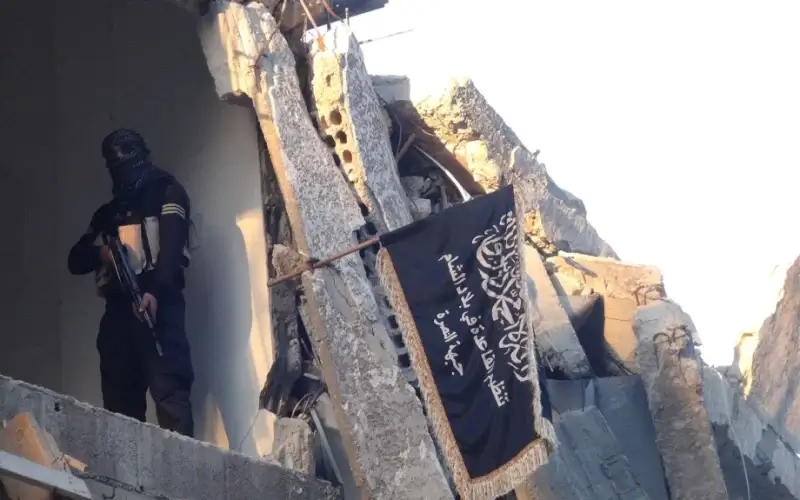Al-Qaida, boosted by leadership stability and the Taliban takeover of Afghanistan, appears to be positioning itself to once again be seen as the world's preeminent terror group and as the greatest long-term threat to the West.
Intelligence shared by United Nations member states and published in a new report Tuesday, finds al-Qaida is enjoying a degree of freedom under Taliban rule that has allowed its leadership to communicate more often and more easily with affiliates and followers, and sell itself as a more attractive option than its rival, the Islamic State terror group, also known as IS, ISIS or ISIL.
"The international context is favorable to al-Qaida, which intends to be recognized again as the leader of global jihad," according to the U.N. report.
"Al-Qaida propaganda is now better developed to compete with ISIL as the key actor in inspiring the international threat environment, and it may ultimately become a greater source of directed threat," the report added, noting that IS "has suffered a rapid succession of leadership losses since October 2019, with an as yet unknown impact on its operational health."
The report further concludes that al-Qaida leader Ayman al-Zawahiri, long rumored to be in ill health or dying, is "alive and communicating freely."
The intelligence shared by U.N. member states also concludes al-Qaida has cemented its leadership team in order of seniority, with Zawahiri being followed by Saif al-Adel, long seen as his likely successor, Yazid Mebrak with al-Qaida in the Arabian Peninsula (AQIP), and by Ahmed Diriye with al-Qaida's Somali affiliate al-Shabab.
At least one U.N. member state intelligence agency said al-Qaida now appears to favor its African affiliates over al-Qaida in the Arabian Peninsula (AQAP), a potentially monumental shift given AQAP's history of plotting attacks against the West, like the December 2019 shooting at the U.S. Naval Air Station in Pensacola, Florida.
The intelligence findings also suggests that al-Shabab, in particular, may be gaining financial leverage, with one U.N. member state reporting that the Somalia-based affiliate is using some of its $50 million to $100 million in yearly revenue to directly support al-Qaida's core leadership.
"It is entirely clear that Zawahiri has been shamefully underestimated," Daveed Gartenstein-Ross, a counterterrorism analyst and the CEO of threat analysis firm Valens Global, told VOA. "Al-Qaida is a stronger organization today by far than when Zawahiri first took the reins."
Other analysts say the U.N. report calls into question the long-term effectiveness of U.S. and Western counterterrorism strategies.
"Even after 20 years, some of al-Qaida's most senior operatives remain at large and are ready to carry on the mantle of jihad," Katherine Zimmerman, a fellow at the American Enterprise Institute, told VOA.
"Al-Qaida's bench remains deep even after serious attrition," she texted. "The next generation has now been fighting for 20 years … they are just as experienced (and perhaps with lessons-learned) as OBL [Osama bin Laden], Zawahiri, and Saif al Adel were on 9/11."
But there are questions as to when and whether al-Qaida's core leadership will push for renewed attacks against the West.
"Attacking the U.S. is not the be-all and end-all for al-Qaida," Gartenstein-Ross said. "For the past decade or so, it has deprioritized 9/11 style attacks against the United States for a variety of reasons, including that al-Qaida enjoys many more opportunities within the region."
The U.N. report similarly cautions that while al-Qaida may be better positioned, it is likely to refrain from launching external attacks in order not to embarrass Afghanistan's Taliban rulers and because the al-Qaida core still lacks "an external operational capability."
U.N. member state intelligence agencies, in contrast, view the threat from Islamic State as immediate despite a series of operations by the U.S. and others that have whittled away at the group's senior leadership.
U.N. member states, according to the report, "observed no significant change of direction for the group or its operations in the core conflict zone."
IS, which still commands 6,000 to 10,000 fighters across Syria and Iraq, "remains a resilient and persistent threat owing to its decentralized structure and ability to organize complex attacks."
The report further finds that IS has developed a network of nine regional offices – in Syria, Iraq, Turkey, Afghanistan, Somalia, Africa's Lake Chad Basin, Libya, Yemen, and Egypt's Sinai Peninsula – "to sustain the group's global capability and reputation."
Intelligence from various member states indicates some of the offices are "a work in progress."
The Turkey-based office, known as al-Faruq, is mostly defunct following a series of key arrests by Turkish authorities. IS offices in Libya, Yemen and the Sinai are likewise described, for the moment, as "low-functioning or moribund."
But U.N. member state intelligence suggests IS' offices in Afghanistan, Somalia and the Lake Chad Basin are functioning well.
The al-Karrar office in Somalia, for example, appears to have become a key financial hub for IS despite the terror group's limited presence in the country, moving funds from Yemen to Afghanistan to help buy weapons and pay the salaries of IS fighters in multiple locations.
U.N. member states, though, have not resolved the question of who is leading IS following the death of its previous leader in February.
The report says intelligence agencies have coalesced around three possibilities for the identity of the man known by the nom de guerre Abu al-Hassan al-Hashimi al-Qurashi.
Iraqi national Bashar Khattab Ghazal al-Sumaida'i is "cited as the most likely candidate," according to the report. The other likely candidates are Juma'a Awwad Ibrahim al-Badri, the brother or former IS leader Abu Bakr al-Baghdadi, and Abd al-Raouf al-Muhajir, who led the IS general directorate of provinces.
In May, Turkish officials claimed to have captured the new IS leader during a raid in Istanbul.
Intelligence shared by some U.N. member states for the report suggested that the official captured by Turkish authorities is likely al-Sumaida'i.









